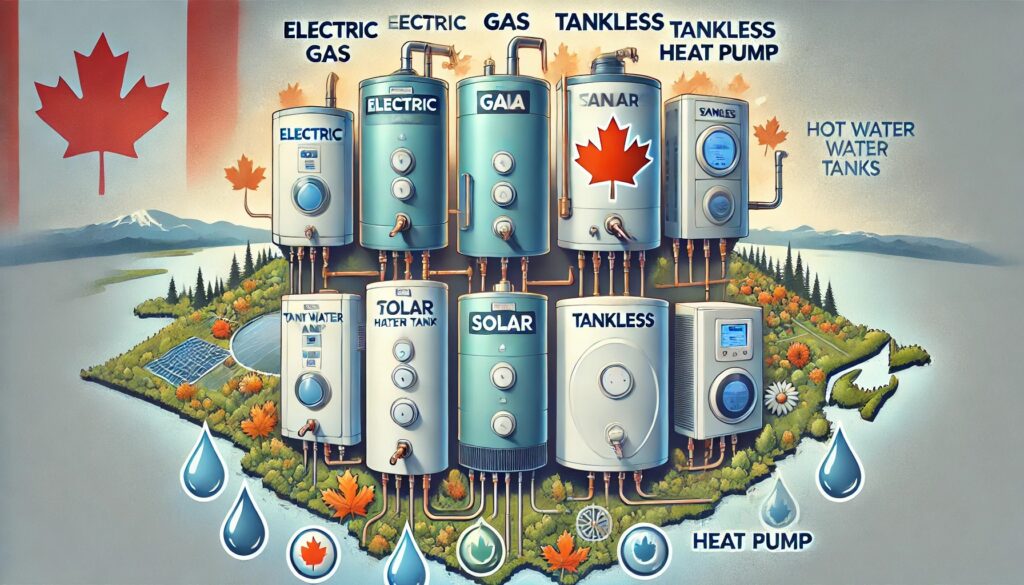General Questions
Q: What types of hot water tanks are available in Canada? A: The main types of hot water tanks available in Canada are electric, gas (natural gas and propane), tankless (on-demand), solar, and heat pump water heaters.
Q: What is the average lifespan of a hot water tank in Canada? A: The average lifespan of a hot water tank in Canada is around 10-15 years, depending on the type, usage, and maintenance.
Q: What are the signs that a hot water tank needs to be replaced? A: Common signs include inconsistent water temperature, rust-colored water, water pooling around the tank, strange noises, and the age of the tank being over 10-15 years.
Q: How do I determine the right size hot water tank for my home? A: The size depends on the number of people in the household and the peak hour demand for hot water. Generally, a 40-50 gallon tank is suitable for 2-4 people, while a 50-80 gallon tank is better for larger households.
Q: What is the cost of installing a new hot water tank in Canada? A: The cost can vary widely depending on the type and size of the tank, ranging from $800 to $3,000, including installation.
Q: Are there energy-efficient hot water tanks available in Canada? A: Yes, there are energy-efficient models such as high-efficiency gas water heaters, electric heat pump water heaters, and tankless water heaters.
Maintenance and Repair
Q: How often should I flush my hot water tank? A: It is recommended to flush your hot water tank at least once a year to remove sediment build-up and maintain efficiency.
Q: What should I do if my hot water tank is leaking? A: If your hot water tank is leaking, turn off the power and water supply to the tank and contact a professional plumber immediately.
Q: Can I repair my hot water tank myself? A: While minor issues like resetting the thermostat or replacing the heating element can be DIY tasks, major repairs should be handled by a professional.
Q: How can I improve the efficiency of my hot water tank? A: Regular maintenance, insulating the tank and pipes, setting the thermostat to 120°F, and using a timer for electric heaters can improve efficiency.
Q: What are the common problems with hot water tanks? A: Common problems include sediment build-up, faulty thermostats, broken heating elements, leaks, and corrosion.
Purchasing and Installation
Q: What should I consider when buying a hot water tank? A: Consider factors like energy efficiency, size, fuel type, cost, warranty, and installation requirements.
Q: Can I install a hot water tank myself? A: Installation should typically be done by a professional to ensure safety and compliance with local codes.
Q: Are there any rebates or incentives for purchasing an energy-efficient hot water tank in Canada? A: Yes, there are various federal and provincial rebates and incentives for purchasing energy-efficient water heaters.
Q: How long does it take to install a new hot water tank? A: Installation usually takes between 2 to 4 hours, depending on the complexity and any additional work required.
Regulations and Safety
Q: Are there any specific regulations for hot water tanks in Canada? A: Yes, hot water tanks must comply with Canadian Standards Association (CSA) regulations and local building codes.
Q: What safety measures should I take with my hot water tank? A: Ensure proper installation, regular maintenance, install a pressure relief valve, and set the thermostat to prevent scalding.
Q: What is the proper temperature setting for a hot water tank? A: The recommended temperature setting is around 120°F (49°C) to balance safety and efficiency.
Q: What are the environmental considerations for hot water tanks? A: Opting for energy-efficient models can reduce energy consumption and greenhouse gas emissions. Proper disposal of old tanks is also important for environmental protection.
Advanced Questions
Q: What is a tankless water heater and how does it work? A: A tankless water heater heats water on demand as it passes through the unit, eliminating the need for a storage tank and providing continuous hot water.
Q: How does a heat pump water heater work? A: A heat pump water heater uses electricity to move heat from the air or ground to heat the water, making it more efficient than traditional electric heaters.
Q: Can solar water heaters be used in Canada? A: Yes, solar water heaters can be used in Canada, but they typically require a backup system due to the variability of sunlight in different regions.
Q: What are hybrid water heaters? A: Hybrid water heaters combine the technology of a heat pump with a traditional storage tank to improve energy efficiency.
Q: How can I maximize the lifespan of my hot water tank? A: Regular maintenance, flushing the tank annually, checking the anode rod, and maintaining the proper temperature setting can help maximize the lifespan.
At Global Plumbing I work with Hot Water Tanks every day. If you have any further questions please feel free to call me. Contact us.

